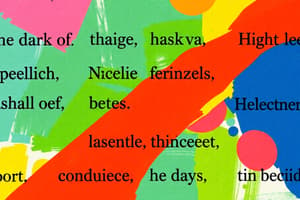Podcast
Questions and Answers
Match the following sentences with the correct phrase: 'haven't got' or 'have got'
Match the following sentences with the correct phrase: 'haven't got' or 'have got'
I haven't got any money today. = 'haven't got' She's got a beautiful voice. = 'have got' Have you got any siblings? = 'have got' They haven't got enough experience for the job. = 'haven't got'
Match the following sentences with the correct phrase: 'haven't got' or 'have got'
Match the following sentences with the correct phrase: 'haven't got' or 'have got'
He hasn't got the skills for the job. = 'haven't got' They have got four children. = 'have got' Have you haven't got a red pen? = 'haven't got' She hasn't got time to spare. = 'haven't got'
Match the following sentences with the correct phrase: 'haven't got' or 'have got'
Match the following sentences with the correct phrase: 'haven't got' or 'have got'
By practicing these sentence structures, you can improve your ability to express lack or absence of something. = Neither The best way to master these phrases is by incorporating them into your daily conversation. = Neither Use them in various contexts and try to come up with your own creative sentences. = Neither It is important to remember that 'have got' is always followed by an object, while 'haven't got' does not require one. = Neither
Study Notes
English Vocabulary for Young Learners
Vocabulary expansion is one of the most important aspects of learning any new language. As a young learner, picking up new phrases and expressions will help you communicate more effectively with native speakers. This article focuses on two commonly used phrases – 'haven't got' and 'have got' – and how they can be integrated into your everyday speech.
Haven't Got
Using 'haven't got' means expressing something that you do not have at present. Here are some examples of sentences where you might use this phrase:
- I haven't got any money today.
- She hasn't got time to spare.
- Have you haven't got a red pen?
- They haven't got enough experience for the job.
By practicing these sentence structures, you can improve your ability to express lack or absence of something in writing and conversation.
Have Got
On the other hand, 'have got' is used to express possession or having something. Here are some examples of sentences where you might use this phrase:
- She's got a beautiful voice.
- They have got four children.
- Have you got any siblings?
- He hasn't got the skills for the job.
It is important to remember that 'have got' is always followed by an object, while 'haven't got' does not require one.
Practice Makes Perfect
The best way to master these phrases is by incorporating them into your daily conversation. Use them in various contexts and try to come up with your own creative sentences. By doing so, you will gradually expand your vocabulary and become more confident in communicating in English.
In conclusion, familiarizing yourself with phrases like 'haven't got' and 'have got' is essential for young learners looking to develop their English vocabulary. These phrases can significantly enhance your communication skills and enable you to express your thoughts more articulately.
Studying That Suits You
Use AI to generate personalized quizzes and flashcards to suit your learning preferences.
Description
Enhance your English vocabulary with phrases 'haven't got' and 'have got'. Learn how to express lack and possession in written and spoken English. Practice using these phrases in sentences to improve your communication skills.




